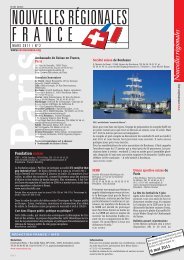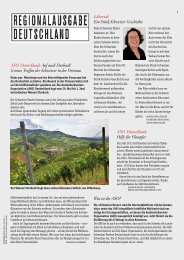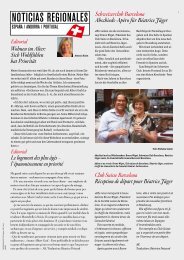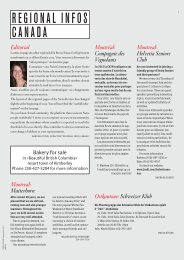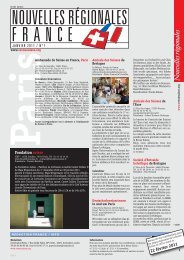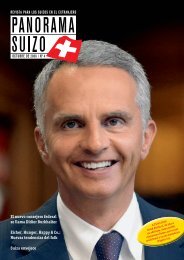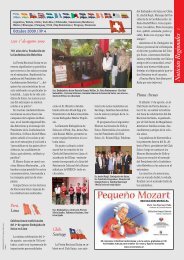Which energy will be best for Switzerland? Doris ... - Schweizer Revue
Which energy will be best for Switzerland? Doris ... - Schweizer Revue
Which energy will be best for Switzerland? Doris ... - Schweizer Revue
You also want an ePaper? Increase the reach of your titles
YUMPU automatically turns print PDFs into web optimized ePapers that Google loves.
POLITICS/VOTING<br />
19<br />
Dual system entrenched in asylum law<br />
An immigration policy that has <strong>be</strong>en practised in <strong>Switzerland</strong><br />
<strong>for</strong> several years is now to <strong>be</strong>come law. EU and EFTA citizens<br />
have unrestricted access to the Swiss labour market, while immigrants<br />
from countries outside these regions have to <strong>be</strong> wellqualified.<br />
A referendum on the bill <strong>will</strong> <strong>be</strong> held on 24 Septem<strong>be</strong>r.<br />
Voters <strong>will</strong> also <strong>be</strong> asked to decide on tougher asylum legislation<br />
and a campaign to transfer Swiss National Bank profits<br />
to the AHV fund. By René Lenzin<br />
The electorate may <strong>be</strong> voting separately on<br />
<strong>for</strong>eigners and the asylum bill, but the two<br />
issues are closely linked. Firstly, they both deal<br />
with the rights of <strong>for</strong>eigners to live and work<br />
in <strong>Switzerland</strong>. Secondly, certain issues necessary<br />
<strong>for</strong> en<strong>for</strong>cement of the asylum law are covered<br />
by Swiss immigration legislation.<br />
The Foreigners’ Law codifies the two-level<br />
immigration policy already widely practised<br />
in <strong>Switzerland</strong>. The Agreement on Free<br />
Movement of Persons with the European<br />
Union grants citizens of EU mem<strong>be</strong>r states<br />
free access to the Swiss labour market. The<br />
same regulations apply to citizens of EFTA<br />
nations. The new law there<strong>for</strong>e only relates<br />
to so-called “third countries” and stipulates<br />
that only well-qualified people from these<br />
countries may enter <strong>Switzerland</strong>. However,<br />
once here, more is to <strong>be</strong> done to assist their<br />
integration than is presently the case. If they<br />
can integrate successfully, they would <strong>be</strong> allowed<br />
to bring their family and have their residence<br />
permit extended. These rights are,<br />
however, <strong>for</strong>mulated as discretionary, which<br />
would lead to different practices in the various<br />
cantons.<br />
No provisions <strong>for</strong> “sans-papiers”<br />
The Federal Council and the centre-right<br />
CVP, FDP and SVP parties support the law.<br />
The bill was approved by 106 votes to 66 in<br />
the National Council, and 33 to 8 in the<br />
Council of States. It was rejected by the Social<br />
Democrats and Greens, who had unsuccessfully<br />
demanded a more generous immigration<br />
policy <strong>for</strong> citizens of third countries<br />
and a special ruling <strong>for</strong> immigrants with no<br />
official papers (“sans-papiers”). They had<br />
called <strong>for</strong> legal residential status <strong>for</strong> well-integrated<br />
<strong>for</strong>eigners living in <strong>Switzerland</strong> without<br />
official permission but unable to return<br />
to their native country. Their opposition<br />
to tougher custodial sentences <strong>for</strong> asylum<br />
seekers also proved unsuccessful. Asylum<br />
seekers who fail to cooperate with the authorities<br />
could face up to two years in prison.<br />
Because of the failure to amend the bill in<br />
Parliament, the Greens and various <strong>for</strong>eigners’<br />
associations tabled a referendum against<br />
the asylum act and gathered the requisite<br />
num<strong>be</strong>r of signatures.<br />
Asylum ruled out <strong>for</strong> illegal immigrants<br />
There’s even more widespread opposition to<br />
the amended asylum act. This is rejected not<br />
only by the Social Democrats and Greens,<br />
but also by ecclesiastical bodies as well as cities<br />
governed by “red-green” coalitions. Opponents<br />
say the act constitutes a breach of<br />
international law and conflicts with<br />
<strong>Switzerland</strong>’s humanitarian traditions. The<br />
re<strong>for</strong>ms would, indeed, tighten the existing<br />
regulations to the detriment of asylum seekers<br />
since immigrants without valid papers<br />
would no longer have the right to seek asylum<br />
in the first place. Exceptions would only<br />
<strong>be</strong> made <strong>for</strong> asylum-seekers who could give<br />
a credible explanation <strong>for</strong> their lack of official<br />
papers. The bill also aims to cut off welfare<br />
payments to all rejected asylum seekers.<br />
At present this applies only to applications<br />
that the authorities refuse to even consider.<br />
The right to emergency assistance would also<br />
<strong>be</strong> restricted. This would now only <strong>be</strong> granted<br />
to failed asylum seekers who cooperated<br />
with their extradition.<br />
In the original bill presented by Federal<br />
Councillor Ruth Metzler, this tougher stance<br />
was cushioned by the introduction of “humanitarian<br />
refugee status”. According to this,<br />
asylum seekers whose applications had <strong>be</strong>en<br />
rejected but who could not <strong>be</strong> expected to<br />
return to their country of origin could work<br />
and bring their families to <strong>Switzerland</strong>. In<br />
accordance with a motion by Metzler’s successor,<br />
Christoph Blocher, parliament reduced<br />
the rights of these temporary residents<br />
to a num<strong>be</strong>r of labour market re<strong>for</strong>ms to facilitate<br />
employment.<br />
The asylum bill was approved by 108 votes<br />
to 69 in the National Council, and 33 votes<br />
to 12 in the Council of States. The Federal<br />
Council and the majority of MPs say the<br />
tougher regulations are designed to combat<br />
abuse of the system. Genuine refugees have<br />
nothing to fear, they say, and <strong>Switzerland</strong>’s<br />
humanitarian traditions remain intact.<br />
SWISS REVIEW August 2006 / No. 4<br />
NATIONAL BANK PROFITS FOR THE AHV?<br />
■ The AHV (Old Age and Survivors’ Insurance) fund should <strong>be</strong> given part<br />
of the Swiss National Bank’s profits. This is the demand made by a people’s<br />
initiative launched by the Social Democrats to <strong>be</strong> put to the people<br />
and the cantons on 24 Septem<strong>be</strong>r. At present, one-third of the SNB’s<br />
profits flow into federal coffers and two-thirds go to the cantons. The<br />
proposal is <strong>for</strong> the first billion francs to <strong>be</strong> given to the cantons and the<br />
rest to the AHV. According to an agreement <strong>be</strong>tween the Federal Government<br />
and the SNB, an annual CHF 2.5 billion a year in profits <strong>will</strong> <strong>be</strong><br />
handed over until 2012. If the initiative were approved, the AVH would<br />
thus stand to get CHF 1.5 billion a year.<br />
How much the fund would receive after 2012 is still under debate. The<br />
initiators of the campaign assume that the SNB’s profits would <strong>be</strong> so high<br />
thereafter that the AHV could receive CHF 1-2 billion annually. They<br />
there<strong>for</strong>e consider the initiative an important tool <strong>for</strong> stabilising the<br />
pension system in the medium term. However, the SNB and opponents<br />
warn about overestimating the bank’s profits. They estimate average future<br />
profits of CHF 1 billion. That would leave nothing <strong>for</strong> the AHV. They<br />
are also concerned about the SNB losing its independence <strong>be</strong>cause it<br />
would have to work <strong>for</strong> maximum profits <strong>for</strong> the AHV’s <strong>be</strong>nefit.<br />
The initiative is backed by the Social Democrats and Greens, but has<br />
<strong>be</strong>en opposed by both the Federal Council and the Christian Democrats,<br />
Free Radical Democrats and Swiss People’s Party. The National Council<br />
and Upper Cham<strong>be</strong>r have rejected it. (RL)



